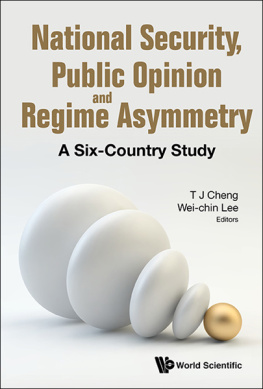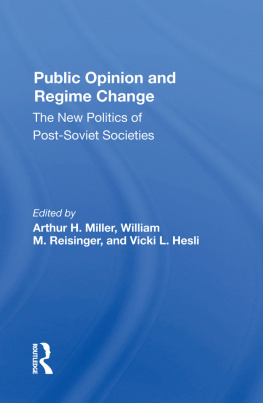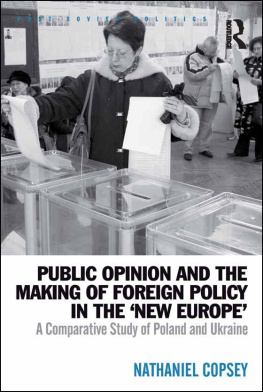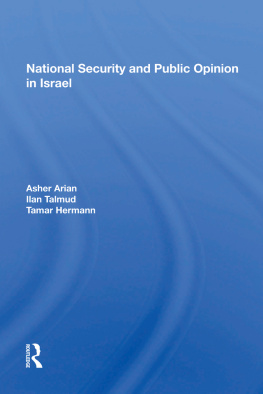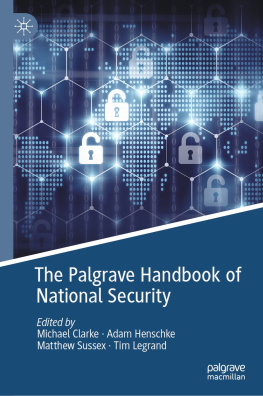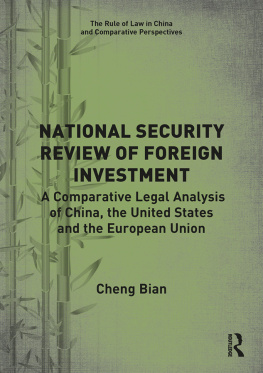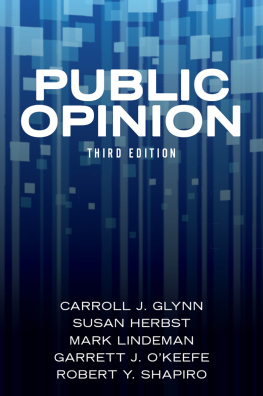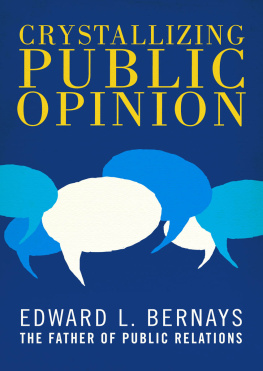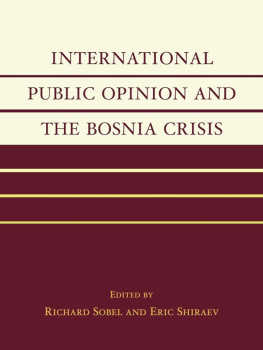

Published by
World Scientific Publishing Co. Pte. Ltd.
5 Toh Tuck Link, Singapore 596224
USA office: 27 Warren Street, Suite 401-402, Hackensack, NJ 07601
UK office: 57 Shelton Street, Covent Garden, London WC2H 9HE
Library of Congress Cataloging-in-Publication Data
Names: Cheng, Tun-jen, editor. | Lee, Wei-chin, 1956 editor.
Title: National security, public opinion and regime asymmetry : a six-country study /
edited by T.J. Cheng, Wei-chin Lee.
Description: Singapore ; New Jersey : World Scientific, 2017. |
Includes bibliographical references and index.
Identifiers: LCCN 2016046279 | ISBN 9789813206946 (hard cover)
Subjects: LCSH: National security--Public opinion--Case studies. | International relations--
Public opinion--Case studies. | Public opinion--Political aspects--Case studies.
Classification: LCC UA10.5 .N296 2017 | DDC 355/.033--dc23
LC record available at https://lccn.loc.gov/2016046279
British Library Cataloguing-in-Publication Data
A catalogue record for this book is available from the British Library.
Copyright 2017 by World Scientific Publishing Co. Pte. Ltd.
All rights reserved. This book, or parts thereof, may not be reproduced in any form or by any means, electronic or mechanical, including photocopying, recording or any information storage and retrieval system now known or to be invented, without written permission from the publisher.
For photocopying of material in this volume, please pay a copying fee through the Copyright Clearance Center, Inc., 222 Rosewood Drive, Danvers, MA 01923, USA. In this case permission to photocopy is not required from the publisher.
Desk Editor: Tay Yu Shan
Typeset by Stallion Press
Email:
Printed in Singapore
CONTENTS
T.J. Cheng and Wei-chin Lee
T.Y. Wang
Jae H. Ku
Paul L. Scham
Paul DAnieri and Taras Kuzio
Tuomas Forsberg and Matti Pesu
Clay Clemens
LIST OF CONTRIBUTORS
T. J. Cheng, Class of 1935 Professor, Department of Government, College of William and Mary, Williamsburg, VA 23187-8795; Email:
Clay Clemens, Chancellor Professor, Department of Government, College of William and Mary, Williamsburg, VA 23187-8795; Email:
Paul DAnieri, Professor of Political Science and Public Policy, University of California Riverside, 900 University Ave., CA 92521; Email:
Tuomas Forsberg, Professor of International Relations, School of Management, University of Tampere, Kanslerinrinne 1, 4th floor (Pinni A4079, Pinni A Building), FI-33014, Finland; Email:
Jae H. Ku, Director, US-Korea Institute at School of Advanced International Studies (SAIS), Johns Hopkins University, 1717 Massachusetts Ave., NW, 6th Floor, Washington, DC 20036; Email:
Taras Kuzio, Senior Research Associate, Canadian Institute for Ukrainian Studies, University of Alberta; and Senior Research Fellow, Chair of Ukrainian Studies, University of Toronto, Non-Resident Fellow, Center
Wei-chin Lee, Professor, Politics and International Affairs, Wake Forest University, Winston-Salem, NC 27106, USA; E-mail:
Matti Pesu, University of Tampere, Finland; E-mail:
Paul L. Scham, Professor and Executive Director, Gildenhorn Institute for Israel Studies, Managing Editor, Israel Studies Review, 423E HJ Patterson Hall, University of Maryland, College Park, MD 20742; E-mail:
T.Y. Wang, Professor, Department of Politics & Government, Illinois State University, Campus Box 4600, Normal, IL 61790-4600; Co-Editor, Journal of Asian and African Studies; E-mail:
ACKNOWLEDGMENT
Our enduring debt of gratitude is first and foremost owed to all chapter contributors for their cheerful responses to our invitation and firm commitment to this edited volume. Without their dedication and timely submission and revision of chapter drafts, this volume would not be possible.
We are also greatly indebted to the Ministry of Foreign Affairs in Taiwan and the Taipei Economic and Cultural Representative Office in Washington, D.C. for their conviction in the scholarly contribution of this research topic and their generous funding to facilitate the preparation of this book project. We are grateful for the comments and encouragement provided by conference participants in the Taiwan and Asian Program Workshop in October 2014 at Washington, D.C., to explore the intriguing relationship between public opinion and foreign policy as the theme of this project.
While the project benefits from the assistance of numerous people, we would like to express our appreciation to Gloria Kuo of the Taipei Economic and Cultural Representative Office in Washington, D.C. for her persistent support of this project, Emily Young for her valuable assistance in editing, and Olivia Sorensen, Department of Government, William and Mary University, for administering the research grant for this book project. The editors at World Scientific Publishing (especially Yu Shan Tay) surely deserve our thanks for their patience during the long process of this project execution and their diligent work in taking care of every step of this book publication.
Needless to say, we are responsible for any errors, mistakes and shortcomings this volume may have.
CHAPTER 1
INTRODUCTION: PUBLIC OPINION, NATIONAL SECURITY AND REGIME ASYMMETRY
T.J. Cheng and Wei-chin Lee
In a democracy, public opinion matters as much as other ingredients, such as political parties and elections. The direction and intensity of public opinion regarding domestic policies, especially with respect to peoples livelihoods, are typically carefully monitored, taken seriously and widely respected as a proxy of vox populi. As Welzien, Durr and others suggest, public preferences and responses to government policy function like a thermostat for public temperament: when the actual policy temperature differs from the preferred policy temperature, the public would send a signal to adjust policy accordingly, and once sufficiently adjusted, the signal would stop.1 In contrast, government response to public opinion on foreign affairs, especially with respect to national security, has long been a controversial issue, acutely criticized by some and vehemently defended by others. For some, the bone of contention is the gauge of public opinion on world affairs, while for others, it is the relevance of public opinion to national security policy.
The return to isolationism after the end of World War I and the debacle of the League of Nations proposal in the United States (US) Congress led Walter Lippmann, an influential columnist at the time, to lament the paucity of public opinion on foreign affairs and national security. In his view, public opinion could be moody, contradictory and ill-informed; hence, a top-down process should be pursued to educate the public.2 If public attitudes on foreign relations are volatile, incoherent and events-driven in nature, then the persistent impact of public opinion on foreign policy matters is questionable. It may well be that public opinion remains essential only when the public has been well informed and alerted to potential policy impacts on national security. After all, the public tends to pay more attention to domestic issues and show relatively less concern to most foreign policy and national security issues.3 As such, it was not surprising that the famed Council on Foreign Relations was founded in 1921 with the mission to enlighten the informed public and spur their interests in foreign affairs and national security.



